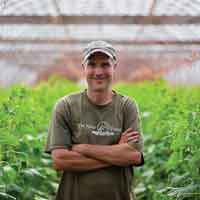 100KM FOODS
100KM FOODS
In 2008, Paul Sawtell and his wife Grace Mandarano left their jobs as sales reps with a pharmaceutical company to launch Toronto-based food-distribution company 100KM Foods.
“We wanted to do something more meaningful,” says Sawtell of the decision to leave the security of corporate life for the uncertainty of entrepreneurialism. “It was a confluence of our values, our passion for sustainability and the sense of purpose this work gives us.”
Like many first-time entrepreneurs, Sawtell and Mandarano quickly realized the enormity of their decision. They didn’t draw a paycheque for nearly three years after 100KM Foods launched, while Sawtell’s job driving the company’s sole delivery truck sometimes took him away from his wife and newborn son for up to three to four days a week.
“There were many dark days,” says Sawtell. “The good thing was Grace and I were never in that valley at the same time, so there was always one person who was optimistic when the other wasn’t.”
Today, those early growing pains are a distant memory — 100KM Foods recorded $7 million in sales last year and now delivers fresh food from 80 farmers to approximately 450 restaurants across southern Ontario.
Its customers range from Oliver & Bonacini Hospitality, Café Boulud and the Fairmont Royal York Hotel, to small independents such as The Yellow Pear and Toronto’s HotBlack Coffee. It also boasts a staff of 27 and 12 trucks.
“We’re onto something,” says Sawtell.
The company focused exclusively on fruits and vegetables at first, but has subsequently expanded to include cheese, milk, egg and fresh meats. “We’re just scratching the surface in terms of our reach into foodservice; 450 customers is a fraction of what’s out there,” says Sawtell. “There’s more opportunity to work with new producers and new restaurants.”
 THE NEW FARM
THE NEW FARM
Brent Preston and Gillian Flies spent the early part of their careers working with non-governmental organizations in the areas of social justice and political development before deciding to grow organic vegetables in Creemore, Ont.
“We were looking for something we could do that we thought was a political issue in our own area, because food is connected to so many things,” says Flies of the couple’s decision to purchase what would become The New Farm in the early 2000s.
More than a decade later, their 100-acre farm supplies organic heirloom produce to about 70 restaurants, including Auberge du Pommier, Marben, Momofuku and The Drake Hotel. Its hallmark is artisanal salads (it sold 45,000 lbs of hand-cut salads last year), including baby spinach, baby arugula and baby kale, as well as cucumbers, beets and potatoes.
But the couple’s journey was characterized by backbreaking work and unanticipated encounters with everything from gophers to crop blight — all captured in Preston’s 2017 book The New Farm: Our Ten Years on the Front Lines of the Good Food Revolution. A Canadian best-seller, the book got picked up by a U.S. publisher earlier this year.
The New Farm has also become a key part of the couple’s continuing efforts in the social-justice space. In addition to educating young farmers, Preston and Flies host events, including the annual Farms for Change charity dinner — which has raised nearly $1 million for Community Food Centres Canada.
The couple has also embraced the emerging practice of regenerative farming in the wake of a sobering UN report warning that all of the world’s topsoil might be gone in 60 years if the current rates of degradation continue.
They have also installed 15 beehives and planted 12,000 indigenous trees for environmental purposes. “We’re going through the checklist of everything you can do to improve the environment and doing all those things,” says Flies.

BLANC DE GRIS
Oyster mushrooms might be known for their antioxidants, but Lysiane Roy-Maheu and Dominique Lynch-Gauthier can attest that their anti-anxiety properties aren’t as apparent — especially when they’re the basis of a fledgling business.
“We made a lot of mistakes in the first three years, but now it’s going great,” says Roy-Maheu, who started Blanc de Gris with her highschool friend in 2014. The Montreal company specializes in oyster mushrooms grown in coffee grounds and brewers’ spent grain.
The growing technique produces a firmer, crunchier mushroom with a nuttier taste. Blanc de Gris’ mushrooms are grown on the exterior of pierced plastic buckets stacked two metres high in a 4,600-sq.-ft. warehouse on Moreau St.
The pair started the business with a small quantity of mushrooms grown in Lynch-Gauthier’s basement, which they took to Montreal chefs in order to gauge their interest. “All the chefs we went to see said yes, so we saw there was potential,” says Roy-Maheu, who worked as a waitress prior to launching Blanc de Gris.
Today, Blanc de Gris produces between 150 and 200 kilograms of mushrooms (which they sell for $35 a kilogram) each week, supplying nearly 50 restaurants, including Joe Beef, Damas and Toqué! The two women would eventually like to expand into other markets such as Toronto and possibly even New York. “It’s a good concept,” says Roy-Maheu. “It’s possible to grow [mushrooms] even if you don’t have a big farm outside of the city.”
Written by Chris Powell

















